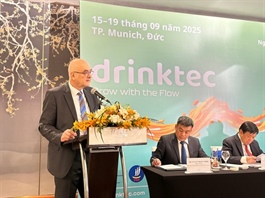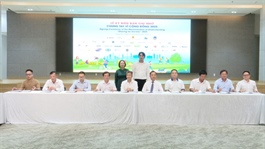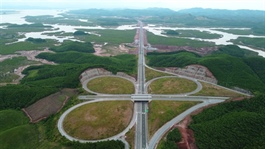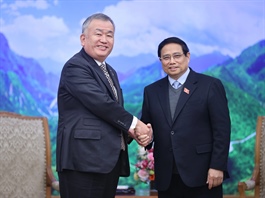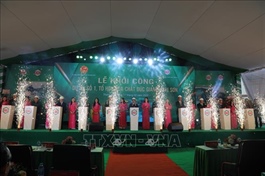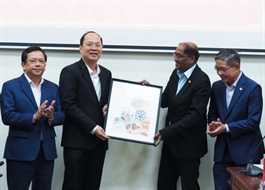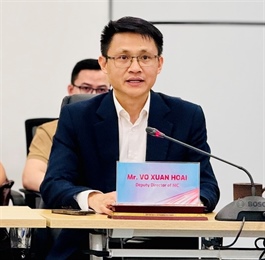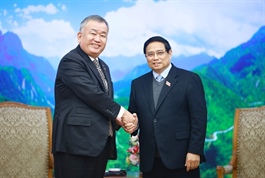Experts offer solutions to ensure Vietnam's power supply
Experts offer solutions to ensure Vietnam's power supply
Experts proposed solutions to ensure power supplies in Vietnam and called for increased private investment during a workshop in Hanoi on February 17.
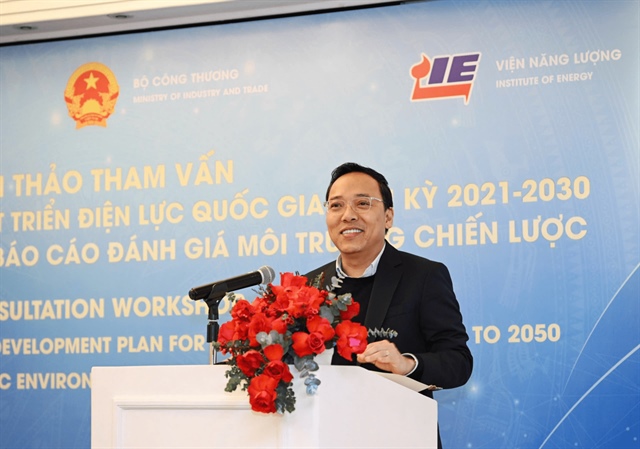
Deputy Minister Nguyen Hoang Long emphasised the pioneering role of the electricity sector in ensuring sufficient supplies for socioeconomic development and people's lives |
In his opening remarks at the workshop, Deputy Minister Nguyen Hoang Long emphasised the pioneering role of the electricity sector in ensuring sufficient supplies for socioeconomic development and people's lives.
The national electricity development plan approved by the prime minister in 2023 introduced innovation, dynamism, and openness. This plan aims to achieve net-zero emissions by 2050 while ensuring a GDP growth rate of about 7 per cent per year from 2021-2030 and from 6.5-7.5 per cent from 2031-2050.
Amid mounting pressure on electricity demand driven by socioeconomic development, Nguyen Manh Cuong, deputy head of the Power System Development Department at the Institute of Energy, put forward seven solutions to ensure the country’s power security.
Firstly, to guarantee stable and uninterrupted electricity supplies, it is imperative to establish a list of emergency projects under the Electricity Law 2024.
Cuong suggested that priority should be given to projects capable of being completed and commissioned from 2025-2027, such as large-scale solar farms, onshore wind power plants, and flexible gas-fired power plants. These projects must be considered for inclusion in the emergency project list to secure electricity supplies.
Ministries, sectors, and localities need to expedite investment policy approvals and investor selection for power generation and grid projects to ensure the operational capacity of power sources meets the growing demand.
Another solution is to effectively implement the plan to import electricity from neighbouring countries such as Laos and China, which is already been considered by the Ministry of Industry and Trade.
It is also essential to ensure the progress of new investments, expansions, and upgrades to the inter-regional transmission network, main trunk lines, and distribution systems in line with the smart grid orientation.
Primary energy supplies like coal and LNG must be secured for existing thermal power plants, while investment in technical infrastructure for LNG imports should be prioritised to satisfy the country’s fuel requirements.
This also aligns with the country’s energy transition roadmap, which aims to gradually reduce dependence on fossil fuels, increase the share of renewable energy to 47 per cent by 2030, and achieve carbon neutrality by 2050.
According to Cuong, the development of nuclear power is considered a crucial solution to ensure energy security while fulfilling Vietnam’s net-zero commitments. However, this approach may encounter challenges such as high initial investment costs, public concerns regarding safety, and the need for robust regulatory frameworks to manage nuclear technology effectively.
Finally, he highlighted the significance of enhancing the power system’s operational capacity, improving the availability of power sources, and equipping operational support tools to ensure system safety amid high renewable energy integration.
Concerning solutions for attracting investment in the power sector, Cuong emphasised the need to improve existing bilateral and multilateral financial mechanisms with governments and international financial institutions, in line with commitments under the Just Energy Transition Partnership, AZEC, and others.
Mechanisms to mobilise green credit, climate credit, and green bonds should also be promoted for state-owned and private enterprises.
Furthermore, it is crucial to formulate and promptly adjust regulations on minimum long-term contracted electricity output applicable to new energy and offshore wind power projects.
“Attention should be paid to strongly attracting the private sector, both domestic and international, to participate in the power sector's development through preferential policies on tax and land, while promoting decentralisation so local authorities can handle administrative procedures. A financial mechanism and transmission pricing policy for socialised transmission grid projects should be promptly developed to encourage the participation of various economic sectors in power grid infrastructure investment,” remarked Cuong.
The transition of the national energy structure towards clean and renewable energy is also a key factor in attracting foreign direct investment (FDI). According to the European Chamber of Commerce in Vietnam, enterprises consider the improvement of administrative procedures and the promotion of sustainable development and environmental protection as the two most important factors driving FDI growth in Vietnam.
Therefore, the effective implementation of the national power plan will attract new FDI inflows and retain existing businesses operating in Vietnam by ensuring a supply of clean renewable energy and environmental protection, aligning with international standards.







